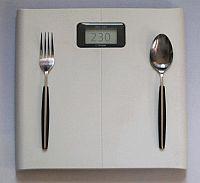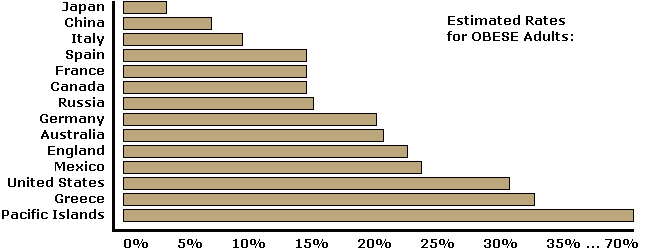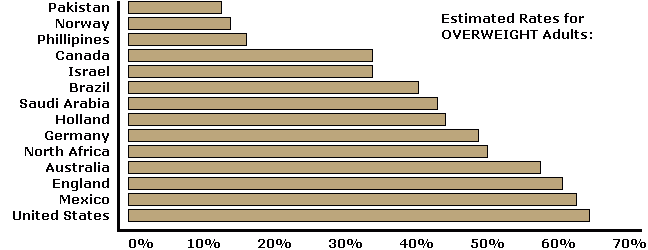Nutritional Aspects of High / Low Carb - Fat - Protein Diets
| Diets
One can speculate, theorize and philosophize ad nauseam why a certain percentage of society is overweight, and why another percentage is not, despite both groups supposedly consuming the same number of calories and following the same exercise program. An estimated 50 billion weight loss dollars are spent annually to compensate for that elusive difference!
Is it all genetic?
Just as an increasing number of everyday medical conditions are being added to a growing list of diseases thought to have a genetic cause or component, evidence is pointing to genetics playing an equally larger role with obesity than previously believed (one example being mutations in genes for the appetite-suppressant hormone leptin). In such cases, even a reasonable dietary lifestyle and adequate exercise alone are generally not sufficient to help someone maintain a normal weight.
According to the World Health Organization (WHO),[1] there are globally more than 1 billion adults overweight and least 300 million of them are clinically obese. Overweight and Obesity can be assessed by using the Body Mass Index (BMI), defined as the weight in kilograms divided by the square of the height in meters (kg/m2 ):
A BMI of >25 kg/m2 is defined as overweight, and a BMI of >30 kg/m2 is defined as obese.
For instance, a person 160 cm [ 5' 3" ] tall, and weighing 80 kg [ 176.37 lb ] has a Body Mass Index of 31.25.
Additional ways to define obesity include measurements of waist circumference, whereby - depending on the country, recommended limits range from 85 cm to 102 cm (33.5 in to 40 in) for men, and from 80 cm to 88 cm (31.5 in to 34.5 in) for women.
Because of ethnic variations and differences in body build, the most reliable assessment of abdominal obesity is considered to be the Waist-to-Hip Ratio, with the cut-off point being greater than 0.95 for men, and greater than 0.90 for women. To calculate the waist-to-hip ratio, use a tape measure, and while standing upright with feet apart:
• Measure the smallest part of your waist, which is just above the belly button - (e.g. 35 in / 89 cm)
• Measure the widest part of your hips, where they meet the top of your legs - (e.g. 37 in / 94 cm)
• Divide your waist measurement by your hip measurement, which is the waist to hip ratio:
In the example above, this would be 35 in / 89 cm divided by 37 in / 94 cm = 0.94 - which is considered ok. A ratio of 1.0 or higher is considered a risk factor for insulin resistance and diabetes, cardiovascular disease and stroke, sleep apnea, and various cancers.
Percentages on the Genetic Cause for an overweight individual's inability to lose weight range from 4% across various ethnic groups, to 25 - 40% within obese families, to about 70% with identical twins. To blame genetics is fuelled in part by observations of obese people not generating the same amount of body heat as lean individuals, and that those with a weight problem are less likely to burn calories through frequent small body movements, but are rather sitting still for a much longer period of time in comparison to their thinner counterparts. The most effective treatment for Morbid Obesity - to reach and maintain significant weight loss - remains surgery.

On the other hand, since the number of Obese Children in many parts of the world has tripled since the mid- 1980s, it is evident that lifestyle - rather than genetics - carries a bigger blame for the increasing number of overweight children, who eventually become overweight adults.
Many other indications support lifestyle-related causes for weight problems. For instance, very few obese people are found during a prolonged war, so the most logical reason then is that the tendency for weight gain is acquired - with perhaps some underlying genetics helping the cause. It would further explain the effects of cultural differences on someone's weight largely dissipating once the individual has adapted to the lifestyle in a new country.
Of course a number of medical conditions (such as hypothyroidism, hypogonadism and related endocrinous or endogenous disorders) can trigger weight gain, and many prescription drugs are known to affect people's weight, so it is important to pursue aggressive treatments for these conditions, and/or switch to medications that are better tolerated.
While overweight / obesity rates for most industrialized nations provide at best a rough estimate, there is a bigger discrepancy when trying to compile statistics for some third world countries. In India for instance, the percentage of overweight adults can range from as low as 8% in some rural areas to as high as 37% in some urban centers. At the same time, there are some regions where the population is underweight by as much as 37% (by WHO standards).

Since weight loss is possible with most overweight individuals following any of a vast number of weight loss programs, it comes down to the type of lifestyle that will keep the person healthy, have him or her maintain their ideal weight, while at the same time causing the least restrictions on the types of foods consumed, so
Weight Loss Clinics
In addition to their proprietary weight-reducing programs, some weight loss clinics also provide clients with Vitamin B12 and/or Vitamin B6 injections. For most people, extra Vit B12 improves energy, well-being, and it supports thyroid functions, however some individuals already exhibit above-normal Vitamin B12 levels, and of those, a small percentage experiences panic anxiety-like symptoms following a Vitamin B12 shot, or a worsening of Mitral Valve Prolapse (MVP) symptoms (which are rarely attributed to B12 injections), so this should be kept in mind if those symptoms are experienced.
Vitamin B6 can help with weight loss through a stimulating effect on the thyroid as well, which - by boosting the right cardiac output, reduces water retention, hence the diuretic attributes. In those with a disposition for hypoglycemia (low blood sugar), higher doses of Vitamin B6 or higher doses of Vitamin C are not advisable since they can trigger erratic blood sugar changes and depressive mood swings.
Larger doses of Vitamin B6 will also result in a high Magnesium / low Calcium Ratio, so if not matched to a patient's requirements (which can happen when Vitamin B6 + Vitamin B12 injections are regularly given at weight loss clinics), a severe calcium deficiency develops. This by itself - or when aggravated by an overstimulated thyroid from the regular Vitamin B6 / B12 shots - can result in insomnia, anxieties, mood swings, chest pains, depression, joint pains, muscle cramps, or other symptoms.
In someone suffering from Hypothyroidism and Low Sodium, Vitamin B6 supplementation on a long-term basis has a tendency to eventually lower thyroid functions even more, although a brief boost will still take place every time Vitamin B6 is injected or taken orally. In addition, Vitamin B6 will only affect T4 (thyroxine) levels, but no conversion to T3 (triiodothyronine) takes place - causing a T3 / T4 thyroid ratio conflict, so rather than trying to boost thyroid functions with Vitamin B6 injections for weight loss purposes, iodine, selenium, and tyrosine status should be checked and corrected instead.
Weight Loss Diets
Of the many weight loss diets [2] offered over the years (Atkins, Sears / Zone, Sugar Busters, Bernstein, Food Combining, Pritikin, Macdougall, Somersize, Beverly Hills, Caveman, Body Type, Body Code, Cabbage Soup, Grapefruit, Herbalife, Scarsdale, Ornish, NutriSystem, Celebrity, Fit For Life, Volumetrics, Subway, South Beach, diet, etc...), they either fall into a low-fat, mostly vegetarian-based category, or they typically promote higher protein (and fat), and low carbs.
Some of these diets include specific food combining rules where for instance fruit can only be eaten on an empty stomach, while carbs cannot be consumed together with fats or protein (one has to wait for 3 hours between these food groups). On the other hand, carbs may be combined with vegetables, while protein and fats may also be combined with vegetables.
Of course, a normal digestive tract is well equipped to handle carbs, fat, and protein in the same meal, so instead of observing difficult-to-follow food-eating guidelines, those who believe that they have lost the ability to digest, or metabolize a mixed meal, an easier solution would be to simply supplement a digestive aid.
There are also diets based on readings from the famed psychic Edgar Cayce, who believed that diets should be comprised of 80% alkaline-producing foods (most fruits and vegetables), and of 20% acid-producing foods (meat, sugar, most grains), and there are more peculiar diets, such as the Christian-based Weigh Down diet, which permits one to eat any type of junk food as long as one does not overeat, while Peter D'Adamo's "Eat right for your Type / Blood Type Diet" is based on the claim that people are better off (including with weight management) when following a diet formulated according to their specific blood type.
Many of these (fad) diets unfortunately don't encourage a long-term common sense approach to eating, such as focusing on a balanced and moderate intake of several basic food groups. Following a best-selling Diet Book, many people generally don't consider the health implications for anyone following specific dietary recommendations that may result in quick weight loss (without establishing individual safety), or they neglect the long-term health effects of Yo-Yo dieting, including a risk of developing Gallstones as a result of too quick or large weight loss, in contrast to losing weight gradually, which generally reduces the risk for obesity related gallstones.
A common practice with weight loss shakes and special dietary formulations is to add extra Potassium for its diuretic properties. While it is one of the most important and effective nutrients to aid weight loss and support kidney functions, individuals with chronic inflammatory bladder problems or certain kidney diseases have to use potassium-enhanced products with caution.
However many high protein / low carb diets do result in potassium (and zinc) loss due to greater sodium and phosphorus retention when followed for a long time, so the addition of extra potassium (and extra zinc) may be necessary, with their requirements being ideally evaluated by a health professional. For details on various forms and the most cost-efficient types of potassium see "How to take Potassium Supplements."
On the other hand, foods high in Copper and/or Iron (e.g. liver, oysters, cocoa, soy, some seeds and nuts, seaweed / spirulina...), or copper / iron-containing supplements tend to promote weight gain - independent of any calorie-related weight gain resulting from consuming these foods.
Carb / Fat / Protein Ratios
Most diets are successful in the short run because they restrict one particular food group (usually carbs or fats), without making up the calorie loss by increasing the intake of another food group. This way, they effectively reduce total calorie consumption (the real cause for weight loss), and credit a change in the Carb / Fat / Protein ratio as the advertised cause for the weight loss. When adding up the total daily calories, many of these programs are in fact close to a starvation diet.
Some Diet Gurus go so far and use "scientific" reasons to explain the success of their particular 'Low Carb' diets by blaming a high carbohydrate intake for promoting insulin resistance and a rise in triglycerides. When reviewing those claims, they fail to mention Simple, Refined, and Complex Carbs, and the contrasting effects of simple carbs on VLDL triglycerides (heart disease / stroke, blood sugar management), the immune system (WBC, phagocytosis / inflammation, leukemia), and their extra nutritional requirements (manganese, w3 EFAs, chromium, biotin, Vitamin C, germanium).
Obviously, it seems to have escaped their research that in contrast to consuming Simple Carbs, the extra fiber, nutrients, and different metabolic attributes of Complex Carbs make a tremendous difference in the success rate to lose weight. (see also Acu-Cell "Sugar & Glycemic Index").
For weight control purposes, the body does not care whether a larger percentage of daily calories come from complex carbs, or from protein, provided caloric intake matches energy expenditure. The advantage of a high protein diet is clearly that - unlike fat or carbohydrates - protein is not as readily converted to fat. There is also its superior satiety, particularly for those who do not have the resources to nutritionally fine-tune their body, which might otherwise achieve a similar satiety with high complex carb diets, as with high protein ones.
Do High Protein Diets cause kidney damage or osteoporosis?
The effects of a very high protein intake on bone loss or kidney functions is definitely a concern and cannot be dismissed. A practitioner who has the resources to do a thorough nutritional analysis can easily demonstrate an increasingly abnormal high phosphorus / low calcium ratio taking place even in many seemingly healthy patients after following a prolonged high protein diet. If not compensated for, this can become a significant cause or contributing factor for osteoporosis, arthritis, or even hemorrhaging stroke. Patients following a high-protein diet and were also taking anti-inflammatory medications such as Celebrex, Vioxx, Aspirin, or other NSAIDs, additionally presented with abnormally high sodium / low magnesium ratios, risking bone loss, renal, and cardiovascular disease.
While of less concern for those with normal, healthy kidneys, many overweight individuals are already at a higher risk for Type II diabetes and at the same time - or as a result of it - suffer more often from reduced renal (kidney) functions. So unless monitored by a health professional, who would be able to compensate for nutritional shortcomings, the effects of prolonged do-it-yourself high-protein dieting may come back to haunt those who believe that following the advice of a Best-Selling Diet Book is the answer. Those advocating a high fat diet represent a similar mentality with little regard to long-term health risks, including developing Type II diabetes or some cancers.
Of the patients who experienced impaired kidney functions after following a prolonged high protein diet, Pantothenic acid (Vitamin B5) was deficient in every single case, while the requirements for extra zinc, calcium, magnesium, potassium, or other nutritional support varied considerably from one patient to the next, depending on other health-related factors, age, and any medications taken at the same time.
Although a frequent association is made between high protein diets and a greater risk for bone loss (which is usually dismissed by those who advocate such diets), a high carbohydrate diet can create a similar nutritional environment by generally being higher in phosphates / phytic acid (grains, cereals, bread, pasta). The same applies to diets that contain higher amounts of oxalic acid (Swiss chard, spinach, rhubarb, beets, wheat germ, cocoa). So the end result - a higher risk for osteoporosis by either inhibiting calcium uptake, or by lowering its ratio - is the same.
Because of long-term negative health effects attributed to "Low Carb / High Protein / High Fat" diets (such as Atkins), some entries into the diet craze have formulated the high protein success around healthier types of fats and carbs (such as the South Beach diet), which is a step in the right direction and comes closer to replacing temporary weight loss programs with a more permanent, healthier lifestyle.
Some people achieve weight loss by adapting a Vegetarian Lifestyle, while others fail miserably in trying to do the same. The ones that succeed may do so as a result of increased potassium and zinc levels which help reduce water retention and moderately help their metabolism as well. The success may also depend on the way vegetables are prepared, whereby overcooking will spare more calories for fat storage, versus those who consume much of their vegetables raw, which requires greater amounts of calories for food metabolism and as such reduce weight gain. Regardless (and particularly when much of the food is consumed raw), Vegan Diets achieve the least satiety no matter how well an individual's chemistry is optimized, so they are suitable for only a smaller percentage of the population.

An extract of Green Coffee Beans, advertised to help with weight loss, was given the 'thumbs up' after passing a "randomized, double-blind, placebo-controlled trial," consisting of 16 (!) test subjects. The results were published in the Jan. 2012 issue of "Diabetes, Metabolic Syndrome and Obesity."
Although the study was small, it established "chlorogenic acid" to be the main ingredient responsible for the average 10.5% overall weight loss, and a 16% overall reduction in body fat.[3] However some analysts concluded that the placebo & treatment groups lost about the same amount of weight.
Dietary Fiber not only plays an important role with weight management, but it also benefits those who suffer from insulin resistance, blood sugar, and cholesterol-related problems. Sources of Insoluble Fiber include wheat bran, whole-grain products, cereals, nuts, and the skins of some fruits and root vegetables. Sources of Soluble Fiber include Konjac glucomannan, xanthan gum, guar gum, psyllium husks, oats, flax seed, pectine, and most fruits without the skin.
Since dietary sources of soluble fiber convey a feeling of fullness, without the gas and bloating some prone individuals experience from a higher intake of insoluble fiber, a number of soluble fiber supplements have been specifically formulated and sold for this appetite-suppressing effect, whereby the degree of expansion in water (viscosity) determines the overall effectiveness of such products for weight control purposes.
The Time spent on eating a Meal has also some effect on satiety, since it takes about 20 minutes for the stomach to convey a feeling of fullness. The slower food is consumed, the more likely the average individual's appetite is satisfied with an average-seized meal. This should help particularly those who have a tendency to overeat, and thus curb their desire for extra and larger desserts.
Going through Middle Age can be a challenge even for those who previously did not have to watch their weight. Following the hormonal changes taking place post menopause (females) or andropause (males), many individuals experience a steady decline in potassium and zinc levels, which can lead to water retention, slowed metabolism, and subsequent weight gain. Other potential effects of insufficient zinc and potassium levels include fatigue, loss of libido and a rise in blood pressure and/or blood sugar.
Bottom line, excessive Weight Gain can be the result of:
- consuming too many calories in comparison to physical exercise / expenditure.
- consuming the wrong foods (too many Simple Carbs or processed / hydrogenated fats & oils): High-Fructose Corn Syrup and other syrups, sugar, honey, nectar, sweet fruit or fruit juice, alcohol, deep-fried convenience foods, donuts, margarine, peanuts / peanut butter... ok are: eggs, raw nuts, moderate amounts of monounsaturated oils, and small amounts or saturated fats (coconut oil, butter).
- use of drugs,[4] or inadequate nutritional support (low potassium, zinc, iodine, stomach acid...., vs high copper and/or iron levels).
- food additives such as MSG / hydrolyzed protein, alloxan, or benzoates..., toxic metals such as arsenic or cadmium..., or foods heated / stored in plastic containers that release bisphenol-A, or phthalates, all of which contribute to obesity, and/or diabetes. aspartame (NutraSweet, Equal) --- use sweeteners such as stevia, or if tolerated, Xylitol instead.
- being infected by any of several strains of bacteria (e.g. Helicobacter Pylori) known to cause gastric disorders, including stomach ulcers. Affected individuals may mistake chronic stomach discomfort for hunger pangs, resulting in weight gain by leading them to overeat to keep their stomach comfortable.
- being a disease in itself (genetic disorder, hormonal condition, kidney / liver / heart disease).
Many Diets help with weight loss only by introducing a negative, or unhealthy factor (being one-sided), while contributing little or nothing to meet the body's long-term nutritional needs. The Best Diets are those that not only combine nutritional balance with a controlled calorie intake, but also observe common-sense rules (such as those listed above), and can be integrated into a permanent lifestyle by promoting and helping maintain one's ideal weight and good health.

 Manganese may help with some symptoms of Parkinson's disease such as muscle rigidity and twitching...
Manganese may help with some symptoms of Parkinson's disease such as muscle rigidity and twitching...
 Research shows that phytosterols such as beta-sitosterol may help normalize the function of natural killer cells and T-helper lymphocytes...
Research shows that phytosterols such as beta-sitosterol may help normalize the function of natural killer cells and T-helper lymphocytes...
 Iron deficiency may be suspect with some forms of ADHD. 84% of children with ADHD were found to have abnormally low levels of ferritin...
Iron deficiency may be suspect with some forms of ADHD. 84% of children with ADHD were found to have abnormally low levels of ferritin...
 A high intake of B Vitamins can trigger heart palpitations, HBP, major complications in patients with congestive heart disease...
A high intake of B Vitamins can trigger heart palpitations, HBP, major complications in patients with congestive heart disease...